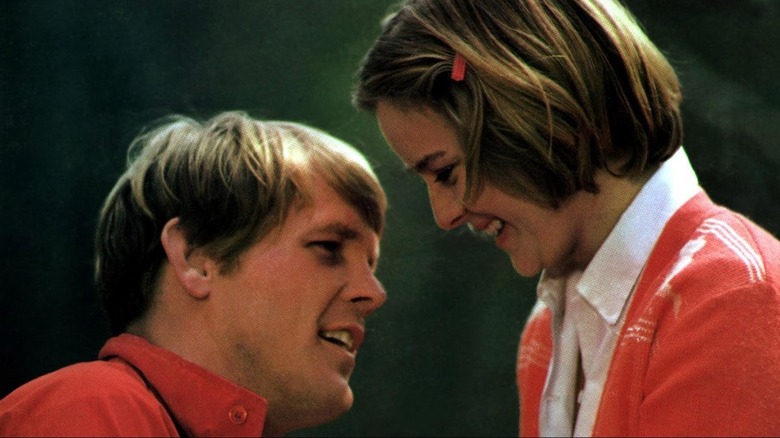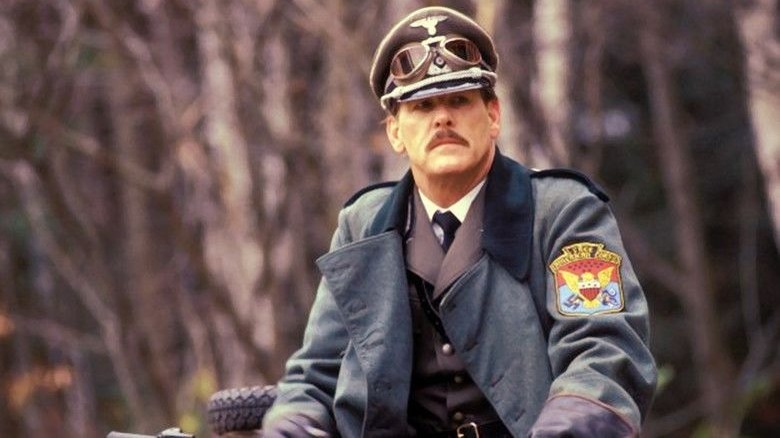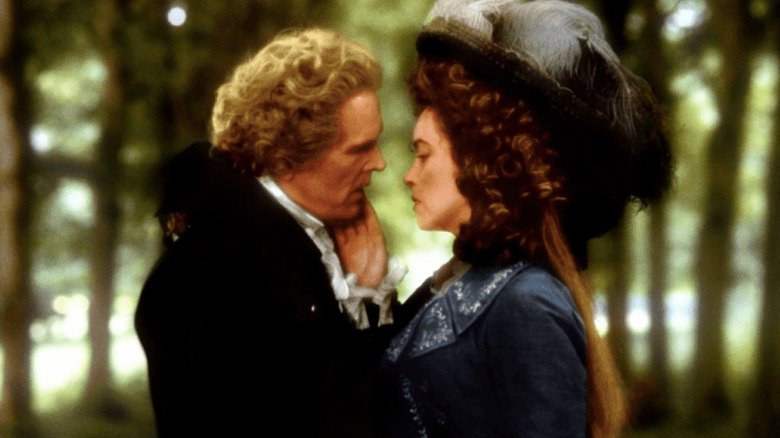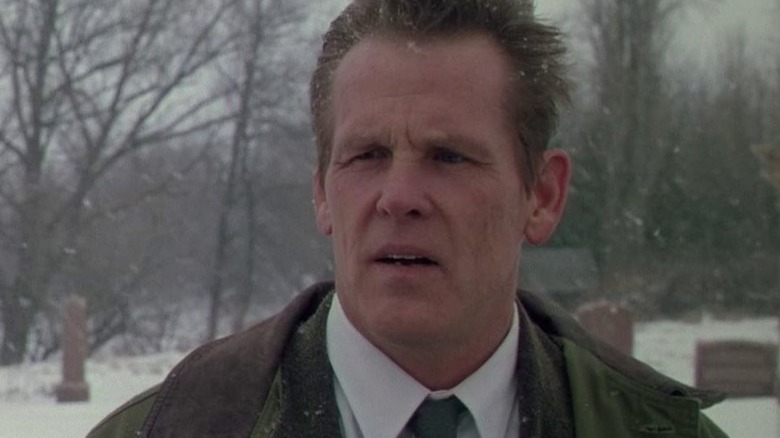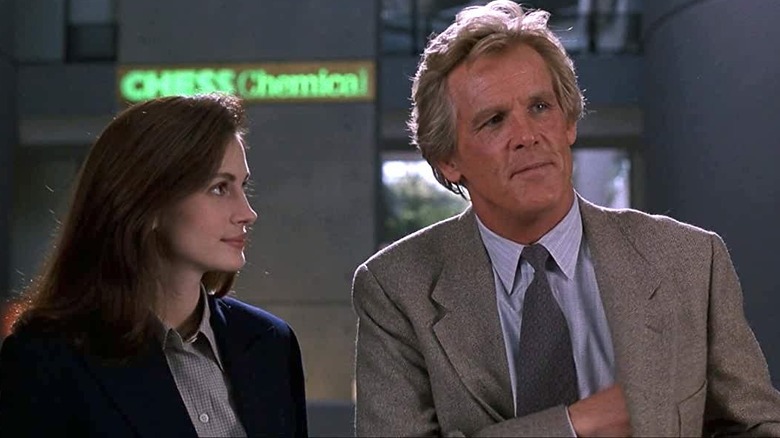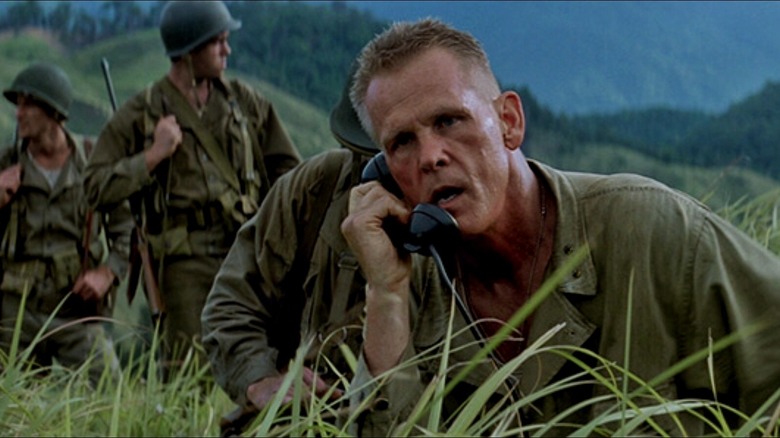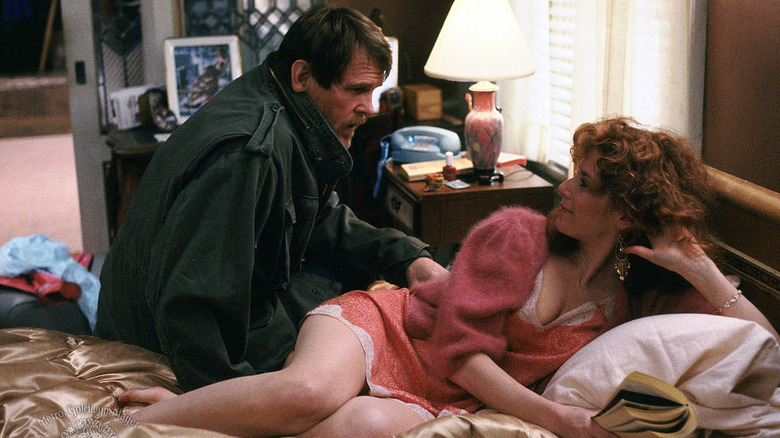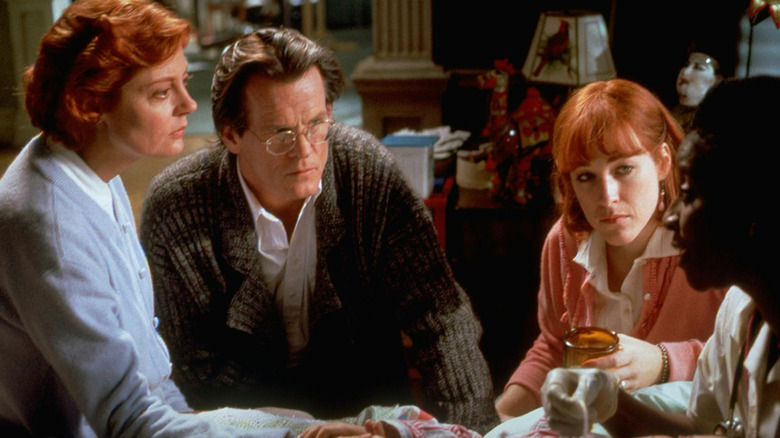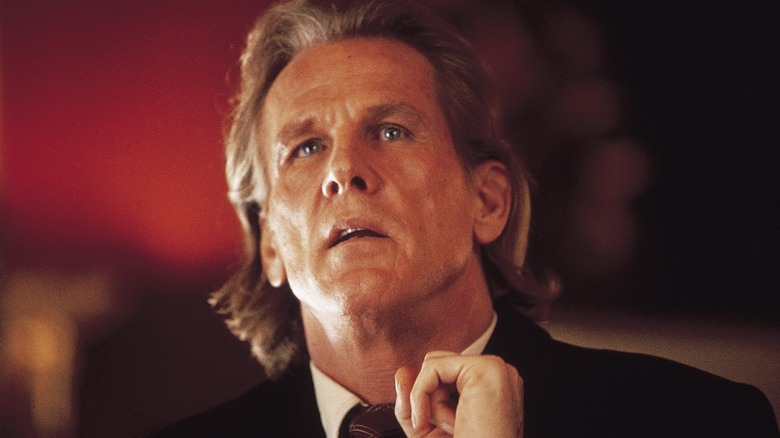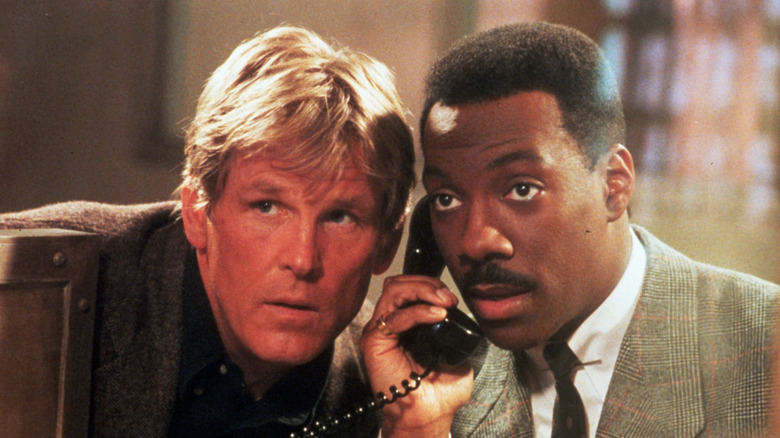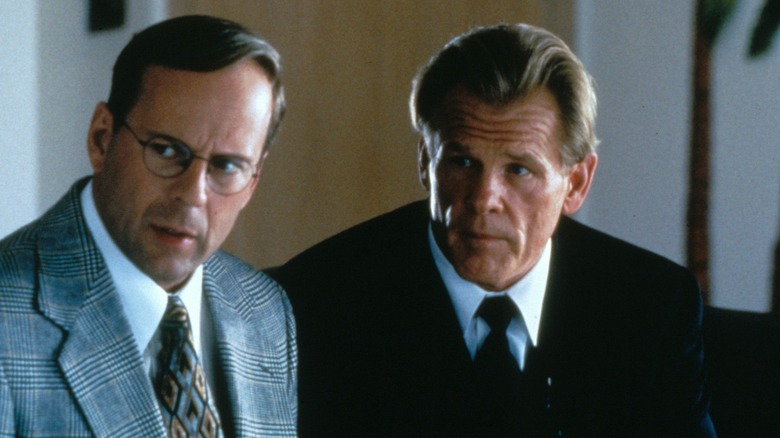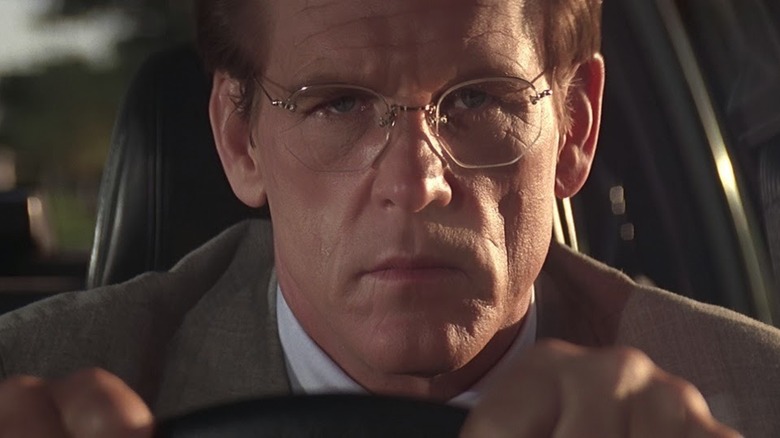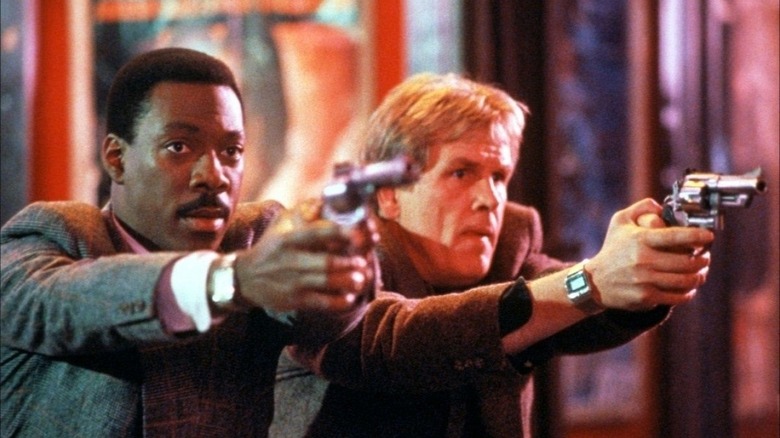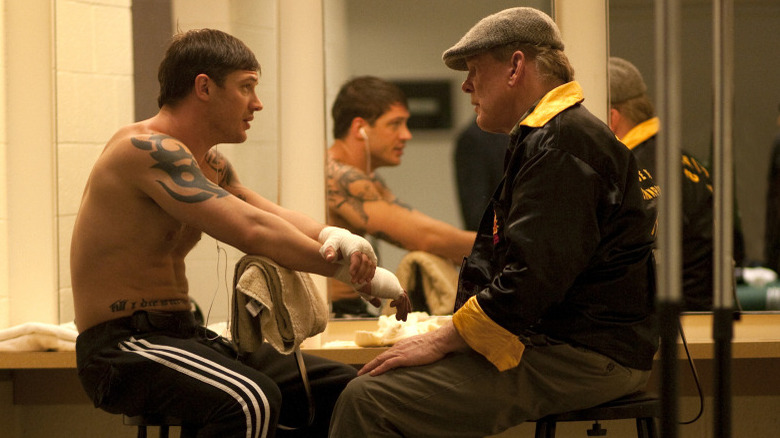The 7 Best And 7 Worst Nick Nolte Movies Ranked
If you were around and watching movies in the '80s or '90s, you probably know actor Nick Nolte from dramas like "The Prince of Tides" or action comedies like "48 Hrs." If you're on the younger side, perhaps you recognize his voice, having lent his talents to animated characters in "The Zookeeper," and even a pugnacious alien scrapper in "The Mandalorian." Known for his gravelly tones and cold stare, he's a Hollywood veteran with a career that stretches back to the 1970s and continues today. He's been in movies from every genre, but seems most at home in strong leading roles as a grizzled detective, a veteran soldier, or just an ordinary man on a mission.
By no means has Nolte's career consisted of all winners, with just as many duds dotting his resume as fan-favorite films. From dramas to comedies, from mysteries to action movies, he's had his share of classics and clunkers. If you're wondering which are his best and his worst, look no further, because we've collected a list of them all right here.
Worst: Return to Macon County
The 1978 drama "Return to Macon County" is actually a sequel to the film "Macon County Line." The original is notable mostly for being among the highest-grossing movies of 1974, at least when it comes to independent films (via TCM). Nick Nolte joined the cast for the sequel, and since it followed up to a popular and relatively successful indie movie, must have had high hopes it could be something special. Unfortunately, today it's easily one of the actor's most awful titles.
In this nearly unrelated sequel that shares only the same setting, we meet an entirely new cast of characters, with then-unknowns Nolte and Don Johnson (later of "Miami Vice" fame) as a pair of friends making their way to California. Befriending a young woman named Junell (Robin Mattson) who they meet along the way, the two men get caught up in a major misunderstanding that makes them the target of a vengeful lawman, Sgt. Wittaker (Robert Viharo).
With a paper-thin story, "Return to Macon County" seems slapped together from bits and scraps from other, better movies like "Butch Cassidy and the Sundance Kid," "Smokey and the Bandit," and most obviously the strikingly similar "Two Lane Black Top." Unexciting and bordering on exploitation at times, there's nothing worth watching here that hasn't been done far better elsewhere.
Best: Mother Night
Acclaimed American author Kurt Vonnegut remains one of the most beloved novelists of the 20th century, but relatively few of his works had been translated to the screen. Yet Nick Nolte would star in a pair of Vonnegut adaptations during the 1990s, the first based on the author's 1961 classic, "Mother Night." The unsettling story put Nolte into the role of a tyrannical military general in Germany at the height of World War II, serving the Reich as a powerful instrument of the Axis powers.
But Nolte's character, Howard S. Campbell Jr., isn't quite the cut-and-dried villain you might expect. Instead he's a German-American playwright who goes back to his homeland before the war, where he is contacted by American intelligence and turned into a double agent. Instructed to give rousing pro-German speeches to the masses, he uses a series of subtle signals during his addresses to send secret messages to the Allies, becoming an important deep cover asset. Despite his best efforts, Campbell still struggles with the morality of helping the Germans under a fake persona as a racist madman, even as he smuggles information to the Allies.
Critical reception on the film as a whole was mixed to positive, with some having difficulty squaring the film's wry sense of humor with its serious subject matter. Ultimately though, it was Nolte himself who received the most praise.
Worst: Jefferson in Paris
Nick Nolte's career found him at his best in the role of hardened tough guys: streetwise cops, military men, and other stern authority figures. Every now and then he'd impress as an empathetic soul, but when he veered too far from his bread and butter, he wound up a total ham. Such was the case in the 1995 period drama, "Jefferson in Paris," a movie that fictionalized the story of Thomas Jefferson and his days as the American ambassador to France, while inexplicably casting Nolte in the title role.
The film doesn't just cover Jefferson setting the foundation for American diplomacy, but also explores his many scandalous love affairs. This includes his rumored tryst with Maria Cosway, as well as his legendary and controversial relationship with Sally Hemings. The supporting cast around Nolte was stellar, with Gwyneth Paltrow as Patsy Jefferson, and a young Thandiwe Newton as Hemings.
But despite all the big names, "Jefferson in Paris" proved that period pieces were not in Nolte's wheelhouse. It's a terribly misguided movie that fails at every level, with Nolte was awkwardly miscast as one of America's most noted Founding Fathers. He wasn't spared the brunt of criticism from reviewers either: Rolling Stone roasted his performance and the film, calling the affair a "droopy, snail-paced prigs-in-wigs movie" while saying that the actor "seems to think that playing an introspective man means impersonating a wax dummy."
Best: Affliction
After the failure of "Jefferson in Paris," actor Nick Nolte returned to the kinds of stories he'd already had success in, including the crime genre. A string of better-reviewed films followed, including "Mother Night," "Afterglow," and Oliver Stone's "U Turn," but the best was "Affliction," from director Paul Schrader, who wrote "Taxi Driver" and "Raging Bull."
Based on a novel by Russell Banks, the film is about a beleaguered cop who's looking to solve one last crime to salvage his reputation. Beat down by the rigors of life, including childhood mistreatment by his father (James Coburn), the downtrodden Wade Whitehouse (Nolte) has lost custody of his daughter. But when an apparent hunting accident leaves a man dead, Whitehouse comes to believe it was murder, and the case gives him a renewed vigor. Though his fellow officers dismiss his suspicions, Whitehouse is convinced that something more sinister is at play. But as he becomes more obsessed with the case, desperate for a victory, he becomes increasingly unstable.
Full of impressive performances from its cast, Nolte proved a standout and was nominated for a Best Actor Oscar. But it would be his co-star James Coburn who took home an award, winning Best Supporting Actor for his part as the elder Whitehouse. A treatise on tragedy, it's a stirring film with more meaning than a simple detective story.
Worst: I Love Trouble
In 1994, Nick Nolte tested his mettle in a romantic comedy with "I Love Trouble." Though he'd had some success with the comedy genre earlier in his career, with "Down and Out in Beverly Hills" and "Three Fugitives," mixing it with romance was something largely unexplored for the actor. Could he and veteran rom-com star Julia Roberts perhaps make it work? Not quite.
Nolte and Roberts play intrepid reporters working for competing newspapers. When they first meet, it's a cliched encounter where they naturally get on each other's nerves, fighting over covering the story of a massive train crash. But when it becomes clear that the disaster was no accident, they team up to get to the bottom of it, and of course — wouldn't you know it — the two rivals fall in love.
Despite its well-worn concept, it's the lack of humor and romance that's really the problem, not to mention a plot that's unnecessarily complex for a rom-com. Perhaps owing to the real-life trouble on the set behind the scenes, where it's been said that Nolte and Roberts did not get along, the movie is a disaster. There's no chemistry between the two stars at all, which is totally understandable if they hated each other during filming. Roberts was even once quoted as saying that her co-star seemed to "go out of his way to repel people," a description not far off from the film itself.
Best: The Thin Red Line
Perfectly cast in the role of a stern military officer, Nick Nolte was part of the sprawling ensemble of the Terrence Malick epic, "The Thin Red Line." The renowned filmmaker behind the Oscar-winning 1978 film "Days of Heaven" waited an astonishing 20 years for his directorial follow-up, and many of Hollywood's finest actors lined up to star in the World War II drama. Nolte starred as Lt. Colonel. Gordon Tall in a cast that also included Sean Penn, Adrien Brody, George Clooney, Woody Harrelson, and John Travolta.
Based on a 1962 autobiography by James Jones, the film depicts the Battle of Mount Austen, a conflict that played a small part in the Allied assault on Guadalcanal during the latter days of the war. A brilliant piece of filmmaking that proved Malick had lost none of his talent in the two decades since he'd last sat in the director's chair, "The Thin Red Line" was nominated for seven Academy Awards, including Best Picture, Best Director, and Best Adapted Screenplay.
Malick reportedly spent nearly a year editing the massive film, which resulted in several major actors having their roles reduced in the final cut. In some cases, their parts were completely excised, as in the case of Mickey Rourke. Nolte's part was thankfully left intact, and he received a strong reaction for his portrayal of Tall, a combat veteran looking for his last shot at glory, in a film widely regarded as among the best of the '90s.
Worst: Everybody Wins
Just because Nick Nolte did his best work in crime dramas and thrillers doesn't mean they were all hits. Even in the right genre, the actor still had a few duds. One of those was the psychological crime thriller "Everybody Wins" from 1990, co-starring Debra Winger. A compelling true story — or at least loosely inspired by one — "Everybody Wins" had a solid pedigree all around, written by Pulitzer Prize-winning "Death of a Salesman" playwright Arthur Miller.
In this neo-noir crime drama, Nolte is Tom O'Toole, a private eye who is hired by seductress Angela Crispini (Winger) to investigate the death of a local doctor, not believing that the man who had been convicted is truly the one responsible. But Crispini is a jumbled mess of problems herself, erratic and unpredictable. With his client causing all sorts of issues for O'Toole, the detective begins to wonder if he can trust anything she says.
Though it has all the right ingredients to be among Nolte's best, this is one movie that is much less than the sum of its parts and winds up as one of his worst. With a surprisingly sloppy script from Miller, a confusing story, and a talented cast that can't manage to do much with it, "Everybody Wins" had the Los Angeles Times writing. "You know you're in trouble ... from the very first scene."
Best: Lorenzo's Oil
"Mad Max" writer-director George Miller was fresh off his black comedy "The Witches of Eastwick" when he pivoted to a heartfelt tragedy, the emotionally draining drama "Lorenzo's Oil," starring Nick Nolte, Susan Sarandon, and two-time Oscar-winning actor Peter Ustinov. Like "Everybody Wins," this one is based on a true story, that of a young boy who has been diagnosed with a deadly degenerative nerve disorder.
Nolte and Sarandon star as the boy's loving parents, who are unwilling to sit by as he slowly withers away. Redoubling their efforts to help their son, they become obsessed with getting him a treatment. But facing resistance from a medical community that sees them as deluded and looking for miracles, the two activist parents take it upon themselves to research the disease with hopes of doing the impossible and finding a cure.
"Lorenzo's Oil" may never have been a big box office hit, and it did face some criticism for its portrayal of a skeptical — and even sometimes abusive — medical community (via NY Times), but the movie was critically acclaimed and nominated for a pair of Oscars. Admittedly it takes some liberties with the story, but there's no denying the quality of the film, from its poignant premise to its moving portrayals by its stars. The New York Times lauded the two leads for their performances, while calling the movie "tough-minded [and] completely gripping," with "an appealingly brisk, unsentimental style."
Worst: Simpatico
Adapted from the play by Sam Shepard, the 1999 crime drama "Simpatico" may feature one of the finest supporting casts Nolte has ever led, including Jeff Bridges, Sharon Stone, Catherine Keener, and Albert Finney.
The film centers on three former friends, named Vinnie, Lyle, and Rosie. More than 20 years earlier, they pulled off an elaborate scheme to rig a horserace by secretly swapping out the best stallions with slow-running replacements and betting against them. Now years later, Vinnie (Nolte) has long since gone his own way, with things not going so well for him, while Lyle and Rosie (Bridges and Stone) are a married couple and successful horse breeders. But when Vinnie needs Lyle's help in getting him out of a bind, it opens up a can of worms that leads to backstabbing and blackmail.
A potentially intriguing story about a trio of grifters, it sounds like it could have made for a decent thriller on paper. Alas, that was not the case, and two decades later it easily ranks among Nolte's worst films, one that Roger Ebert described as "a long slog" with a "B-movie plot."
Best: 48 Hrs.
The 1980s were an era that saw the buddy cop movie come to prominence with a number of classics like "Lethal Weapon" and "Tango and Cash." But arguably the most genre-defining of them all was 1982's "48 Hrs.," starring rising superstar comedian Eddie Murphy as the wisecracking goofball ex-con, and veteran actor Nick Nolte as the straight-laced, grouchy California cop assigned to work with him. A funny, fast-paced classic and a pioneer of the modern buddy movie formula, it's well-regarded as one of the best action-comedies of all time.
Jack Cates (Nolte) is a hard-nosed, no-nonsense cop on the hunt in San Francisco for ruthless killer and escaped felon Albert Ganz (James Remar). But with no idea where to start, Cates seeks the aid of Ganz's former partner, Reggie Hammond (Murphy), a low-level streetwise crook who may know where to find him. Together, Cates and Hammond make an unlikely team, but their comic chemistry is impeccable, with Murphy's wacky antics juxtaposing brilliantly against Nolte's uptight demeanor.
A landmark film that set the stage for a number of copycats — heavily influencing the films mentioned above and even Murphy's own "Beverly Hills Cop" — it gave Nolte what might be his most iconic role.
Worst: Breakfast of Champions
In 1996 Nolte starred in "Mother Night," an adaptation of a Kurt Vonnegut classic that turned out to be one of the best films of his career. Maybe hoping to recapture that success, or perhaps because he had a fondness for the works of the author, Nolte returned three years later in another film based on a Vonnegut novel: "Breakfast of Champions." Star Bruce Willis departed from his usual action fare to lead this quirky, offbeat comedy, joined by Nolte, Albert Finney, Barbara Hershey, Glenne Headley, and Omar Epps.
Set in the idyllic American burg of Midland City, we follow the life of Dwayne Hoover (Willis), owner of the best darn car dealership in town. But despite the facade of a happily married, successful entrepreneur, Dwayne is actually a miserable man at his wit's end. His lead car salesman, meanwhile, is Harry LeSabre (Nolte), an idiosyncratic man with a secret he's hiding from the world. Using satire to try and say something about commercialism, capitalism, and the weariness of modern life, the movie doesn't do it with enough incisiveness, and winds up saying nothing at all.
After early screenings, "Breakfast of Champions" received scathing reviews, called everything from "an incoherent mess" by the NY Times to "a complete failure" by Variety. With the film being raked over the coals, the studio quickly pulled it from theaters after earning less than $200,000.
Best: Cape Fear
Starring in a remake of a critically acclaimed movie can be risky. Even if it succeeds at living up to the memory of a celebrated film, it can often be forced to dwell in the shadow of its predecessor, never achieving the renown of something new. But in 1991, Nick Nolte starred in a remake of one of the greatest thrillers of all time, the 1962 Gregory Peck classic, "Cape Fear." Directed by acclaimed filmmaker Martin Scorsese, and also featuring Oscar-winner Robert De Niro, it had all the ingredients to soar. Unlike so many remakes it did, managing to match Peck's original and become a favorite in its own right.
Nolte takes Peck's part as well-respected lawyer Sam Bowden, who plays a key role in getting Max Cady (De Niro) — on trial for a violent assault — put away for nearly 15 years. But when Cady is released, his bitterness and rage overflow, and he goes looking for revenge. Rather than target Bowden himself, however, the violent psychopath goes after Bowden's wife and teenage daughter.
A stunning psychological thriller that borders on horror, "Cape Fear" is a twisted, modern update to the original that expands in ways that help elevate it into something special. Gripping, suspenseful, and utterly jaw-dropping, it's a true nail-biter, and the rare remake to become a classic in its own right.
Worst: Another 48 Hrs.
There are countless sequels in Hollywood history that have killed franchises. In fact, it's rarer for a follow-up to do better. But few sequels have fallen any harder or faster than "Another 48 Hrs," the 1991 film that followed a trailblazing first movie and resilient classic. For Murphy, it came not long after "Beverly Hills Cop II" had disappointed, and for Nolte it wasn't far removed from the dismal failure "Everybody Wins," making it a low mark for both of their careers.
In what looked like a promising story, San Francisco cop Jack Cates (Nolte) faces new troubles, as he's investigated for a deadly police shooting. But while on the hunt for a diabolical drug kingpin known as the Iceman, he learns that the sinister crook has put a hit out on his one-time partner Reggie Hammond. Now, the two mismatched old pals team up one more time to stop a madman and prove Jack's innocence at the same time.
Ultimately, nothing about the movie works, and even Nolte and Murphy seem like they're just going through the motions, making the whole thing feel like an obvious cash grab. Its story is a mish-mash, a paint-by-numbers affair with haphazard and lazy execution. There's nothing all that exciting or funny this time around, which is particularly problematic because it followed one of the best action comedies ever made. It remains Nolte's worst film to date.
Best: Warrior
The best film in Nick Nolte's filmography doesn't come from his heyday in the '80s or from one of his well-remembered dramas from the '90s. Instead, it's the 2011 film "Warrior," which starred Tom Hardy and Joel Edgerton as a pair of brothers who compete against one another in an MMA tournament. Here, an older Nolte takes the role of mentor and father to the young upstart fighters, and his complicated relationship with his sons sits at the heart of the film.
Hardy plays Tommy Riordan Conlon, who left home with his ailing mother when his abusive father Paddy (Nolte) became too much to bear, while brother Brendan (Edgerton) ran off with a woman. Now, years later, Paddy has cleaned up his act and is looking to reconcile, but the best Tommy can do is allow him to help him train for an upcoming MMA competition that, should he win, could finally turn his fortunes around. But when Brendan enters the same tournament, Tommy is forced to confront the resentment he's held inside for so many years.
A moving story of family and forgiveness, Nolte's performance as the father seeking absolution helped make the film a critical darling, and would earn him his third Oscar nomination and first in more than a decade. Heaped with good reviews for its heartfelt character drama and intense ringside action, "Warrior" stands tall as Nolte's very best.

